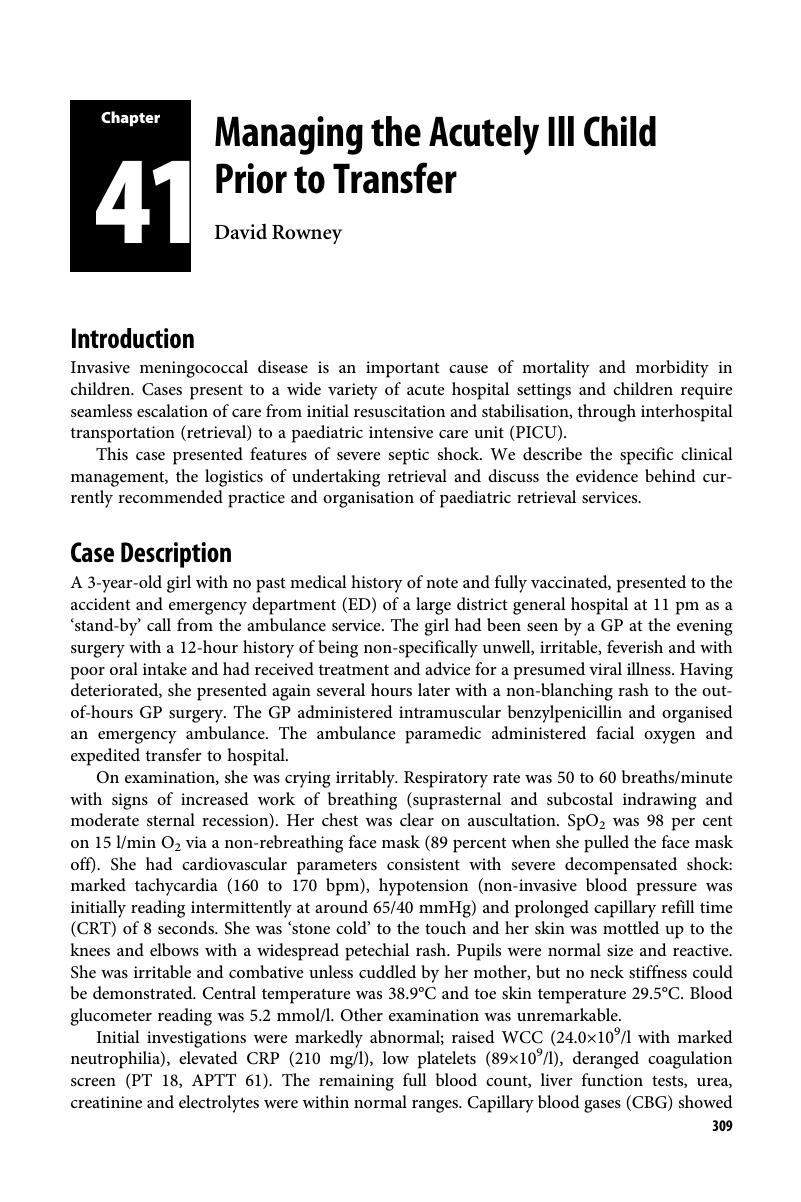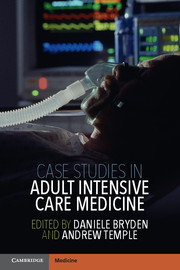Book contents
- Case Studies in Adult Intensive Care Medicine
- Case Studies in Adult Intensive Care Medicine
- Copyright page
- Contents
- Contributors
- Preface
- Levels of Evidence
- Abbreviations Referred to in Case Discussions
- Chapter 1 Cardiac Arrest: Post Resuscitation Management
- Chapter 2 Initial Management of the Polytrauma Patient
- Chapter 3 Management of Major Burns on the Intensive Care Unit
- Chapter 4 Management of Sepsis
- Chapter 5 Rhabdomyolysis
- Chapter 6 Management of Acute Liver Failure
- Chapter 7 Status Epilepticus
- Chapter 8 Acute Ischaemic Stroke
- Chapter 9 Subarachnoid Haemorrhage
- Chapter 10 Management of Traumatic Brain Injury
- Chapter 11 Variceal Haemorrhage
- Chapter 12 Surgical Management of Pancreatitis
- Chapter 13 Intra-abdominal Hypertension and Abdominal Compartment Syndrome
- Chapter 14 Management of the Ventilated Asthmatic Patient
- Chapter 15 Pneumonia
- Chapter 16 Interstitial Lung Disease
- Chapter 17 Chronic Pulmonary Hypertension
- Chapter 18 Acute Lung Injury
- Chapter 19 The Role of Noninvasive Ventilation Following Extubation of Intensive Care Patients
- Chapter 20 Valvular Heart Disease and Endocarditis: Critical Care Management
- Chapter 21 Cardiac Failure Management and Mechanical Assist Devices
- Chapter 22 Management of Common Overdoses
- Chapter 23 Necrotising Soft Tissue Infections in the Intensive Care Unit Setting
- Chapter 24 Fungal Infections
- Chapter 25 The Acutely Jaundiced Patient
- Chapter 26 Massive Haemorrhage
- Chapter 27 Glucose Emergencies
- Chapter 28 Endocrine Emergencies
- Chapter 29 Acid Base Abnormalities
- Chapter 30 Nutrition and Refeeding Syndrome
- Chapter 31 Pre-eclampsia and Eclampsia in Critical Care
- Chapter 32 Airway Management
- Chapter 33 Bronchoscopy and Tracheostomy
- Chapter 34 Central Venous Catheter Infections
- Chapter 35 Ventilator Associated Pneumonia
- Chapter 36 Neuromonitoring
- Chapter 37 Monitoring Cardiac Output
- Chapter 38 The Surgical Patient on Critical Care
- Chapter 39 Delirium in the Intensive Care Unit
- Chapter 40 Death and Organ Donation
- Chapter 41 Managing the Acutely Ill Child Prior to Transfer
- Chapter 42 Who to Admit to Critical Care?
- Chapter 43 Clearing the Cervical Spine in the Unconscious Patient in the Intensive Care Unit
- Chapter 44 Alcohol Related Liver Disease (Whom to Admit to Critical Care, When to Refer to a Specialist Centre)
- Chapter 45 Hyperpyrexia
- Index
- Plate Section (PDF Only)
- References
Chapter 41 - Managing the Acutely Ill Child Prior to Transfer
Published online by Cambridge University Press: 04 May 2017
- Case Studies in Adult Intensive Care Medicine
- Case Studies in Adult Intensive Care Medicine
- Copyright page
- Contents
- Contributors
- Preface
- Levels of Evidence
- Abbreviations Referred to in Case Discussions
- Chapter 1 Cardiac Arrest: Post Resuscitation Management
- Chapter 2 Initial Management of the Polytrauma Patient
- Chapter 3 Management of Major Burns on the Intensive Care Unit
- Chapter 4 Management of Sepsis
- Chapter 5 Rhabdomyolysis
- Chapter 6 Management of Acute Liver Failure
- Chapter 7 Status Epilepticus
- Chapter 8 Acute Ischaemic Stroke
- Chapter 9 Subarachnoid Haemorrhage
- Chapter 10 Management of Traumatic Brain Injury
- Chapter 11 Variceal Haemorrhage
- Chapter 12 Surgical Management of Pancreatitis
- Chapter 13 Intra-abdominal Hypertension and Abdominal Compartment Syndrome
- Chapter 14 Management of the Ventilated Asthmatic Patient
- Chapter 15 Pneumonia
- Chapter 16 Interstitial Lung Disease
- Chapter 17 Chronic Pulmonary Hypertension
- Chapter 18 Acute Lung Injury
- Chapter 19 The Role of Noninvasive Ventilation Following Extubation of Intensive Care Patients
- Chapter 20 Valvular Heart Disease and Endocarditis: Critical Care Management
- Chapter 21 Cardiac Failure Management and Mechanical Assist Devices
- Chapter 22 Management of Common Overdoses
- Chapter 23 Necrotising Soft Tissue Infections in the Intensive Care Unit Setting
- Chapter 24 Fungal Infections
- Chapter 25 The Acutely Jaundiced Patient
- Chapter 26 Massive Haemorrhage
- Chapter 27 Glucose Emergencies
- Chapter 28 Endocrine Emergencies
- Chapter 29 Acid Base Abnormalities
- Chapter 30 Nutrition and Refeeding Syndrome
- Chapter 31 Pre-eclampsia and Eclampsia in Critical Care
- Chapter 32 Airway Management
- Chapter 33 Bronchoscopy and Tracheostomy
- Chapter 34 Central Venous Catheter Infections
- Chapter 35 Ventilator Associated Pneumonia
- Chapter 36 Neuromonitoring
- Chapter 37 Monitoring Cardiac Output
- Chapter 38 The Surgical Patient on Critical Care
- Chapter 39 Delirium in the Intensive Care Unit
- Chapter 40 Death and Organ Donation
- Chapter 41 Managing the Acutely Ill Child Prior to Transfer
- Chapter 42 Who to Admit to Critical Care?
- Chapter 43 Clearing the Cervical Spine in the Unconscious Patient in the Intensive Care Unit
- Chapter 44 Alcohol Related Liver Disease (Whom to Admit to Critical Care, When to Refer to a Specialist Centre)
- Chapter 45 Hyperpyrexia
- Index
- Plate Section (PDF Only)
- References
Summary

- Type
- Chapter
- Information
- Case Studies in Adult Intensive Care Medicine , pp. 309 - 315Publisher: Cambridge University PressPrint publication year: 2017



